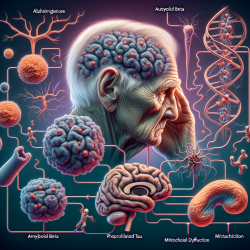Alzheimer's disease (AD) is a progressive neurodegenerative disorder characterized by memory loss and cognitive decline. Recent research has highlighted the critical roles of autophagy and mitophagy in the pathogenesis of AD. These processes are essential for cellular homeostasis, involving the degradation and recycling of cellular components, including damaged mitochondria. This blog post delves into the findings from a recent study on how amyloid beta (Aβ) and phosphorylated tau (P-Tau) proteins induce defective autophagy and mitophagy in AD, offering insights for practitioners seeking to enhance their understanding or explore new therapeutic avenues.
The Role of Autophagy and Mitophagy in Alzheimer's Disease
Autophagy is a cellular process that maintains homeostasis by degrading and recycling damaged organelles and proteins. Mitophagy, a specific type of autophagy, targets damaged mitochondria for degradation. In AD, these processes are disrupted due to the accumulation of Aβ and P-Tau proteins, leading to mitochondrial dysfunction and neuronal damage.
Amyloid Beta and Phosphorylated Tau's Impact
The study reveals that increased levels of Aβ and P-Tau proteins are associated with reduced levels of proteins involved in autophagy and mitophagy. Abnormal interactions between Aβ, P-Tau, and mitochondrial fission protein Drp1 hinder the clearance of damaged mitochondria. This results in the accumulation of cellular debris in neurons affected by AD.
Implications for Practitioners
The findings underscore the importance of targeting autophagic pathways as potential therapeutic strategies for AD. Practitioners can consider the following approaches:
- Enhancing Autophagic Activity: Investigating compounds or interventions that can boost autophagic activity may help clear damaged mitochondria and reduce neuronal damage.
- Targeting Drp1 Interactions: Understanding the role of Drp1 in mitochondrial dynamics could lead to novel therapies that prevent excessive mitochondrial fragmentation.
- Exploring Genetic Modifications: Research into genetic modifications that reduce Aβ and P-Tau levels might offer protective benefits against AD progression.
Encouraging Further Research
The study highlights several areas where further research is needed:
- Molecular Mechanisms: More detailed studies on the molecular mechanisms governing autophagy and mitophagy in AD could uncover new therapeutic targets.
- Clinical Trials: Conducting clinical trials to test potential drugs or interventions aimed at enhancing autophagic pathways in AD patients.
- Animal Models: Utilizing animal models to better understand the impact of genetic modifications on autophagic processes in AD.
The continuous clearance of cellular debris through effective autophagy and mitophagy is crucial for maintaining neuronal health. As research progresses, practitioners are encouraged to stay informed about new developments that could influence treatment strategies for Alzheimer's disease.
To read the original research paper, please follow this link: Amyloid Beta and Phosphorylated Tau-Induced Defective Autophagy and Mitophagy in Alzheimer’s Disease.










